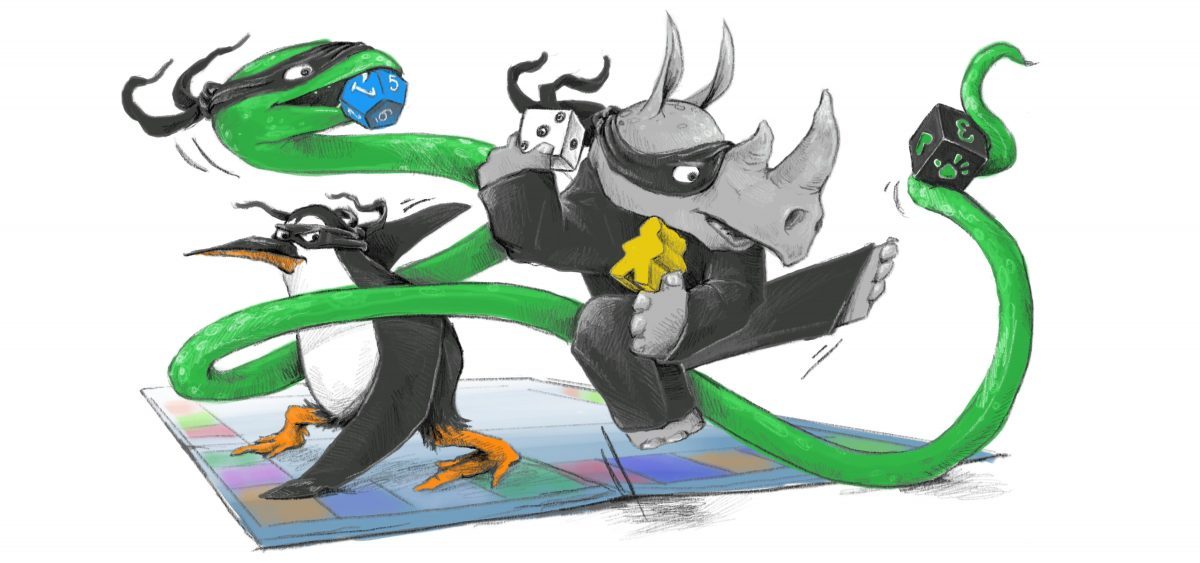There are lots of reasons that I play social deduction games. Fun with my friends, ridiculous behavior, silly nonsense and tense situations. But my reasons never include winning as a condition of whether or not I enjoyed the game. In fact, unless you count Secret Hitler, I almost never win. But I don’t mind losing games, as long as I’m having fun. I mean, if you are only playing to win…
This weekend I finally got to lose The Chameleon a bunch of times. I say lose of course because out of the ten or so rounds we got to play the first night, I was the Chameleon at least 5 times, and my friends are way better at it than I am. I played with another group on the next night, and managed to only be the Chameleon 2 or 3 times (I can’t quite remember). Games went really quickly, so we had time to play a bunch. And we had a lot of fun. Let’s take a look:
So how do you play?
The Chameleon is a very simple game to learn, and to play. The depth comes because the nature of the game itself is kind of vague and open. Every round, you will shuffle up and deal out one of the identity cards to each player. All but one of these cards will have a grid on the back which contains rows of Blue numbers and columns of Yellow numbers. The first player will roll the two dice (1 Blue d8 and 1 Yellow d6). The intersection of the row and the column gives you the coordinates of the Secret Word that everyone will be trying to describe and keep secret from the Chameleon.
One of the cards dealt out will not have the grid. It will simply say “You are the Chameleon.”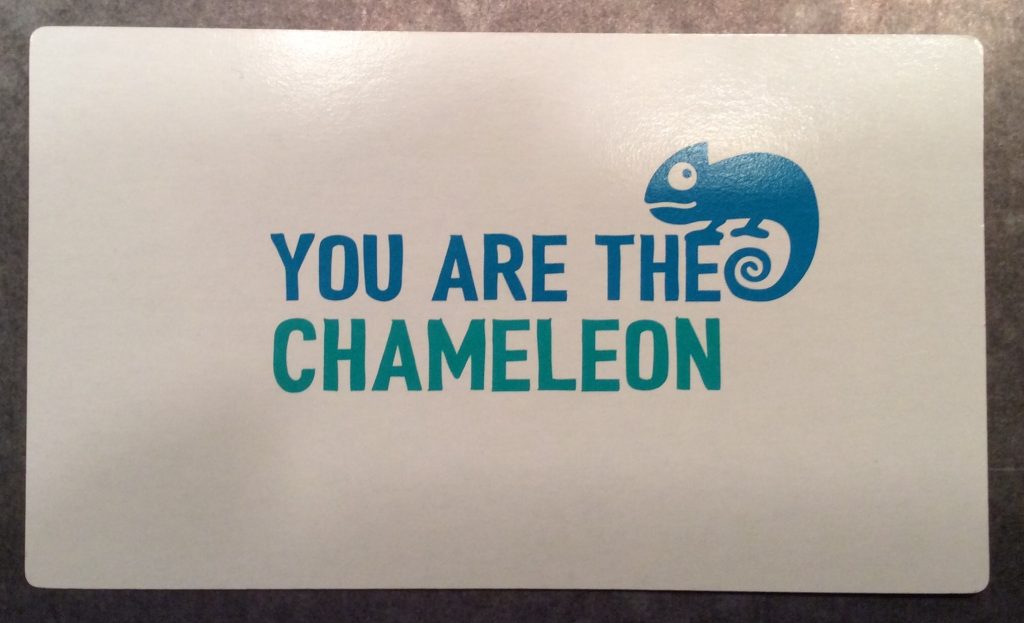 The Chameleon will not know which of the words the other players are describing. They must try to determine from the words given, which word on the grid is the Secret Word, while at the same time not giving away that they are the Chameleon. Which means that when it comes their turn to say a word, they must think quickly and say a word that is vague enough to get by, but not so vague that everyone immediately knows that they are the Chameleon.
The Chameleon will not know which of the words the other players are describing. They must try to determine from the words given, which word on the grid is the Secret Word, while at the same time not giving away that they are the Chameleon. Which means that when it comes their turn to say a word, they must think quickly and say a word that is vague enough to get by, but not so vague that everyone immediately knows that they are the Chameleon.
Example: The Category is Presidents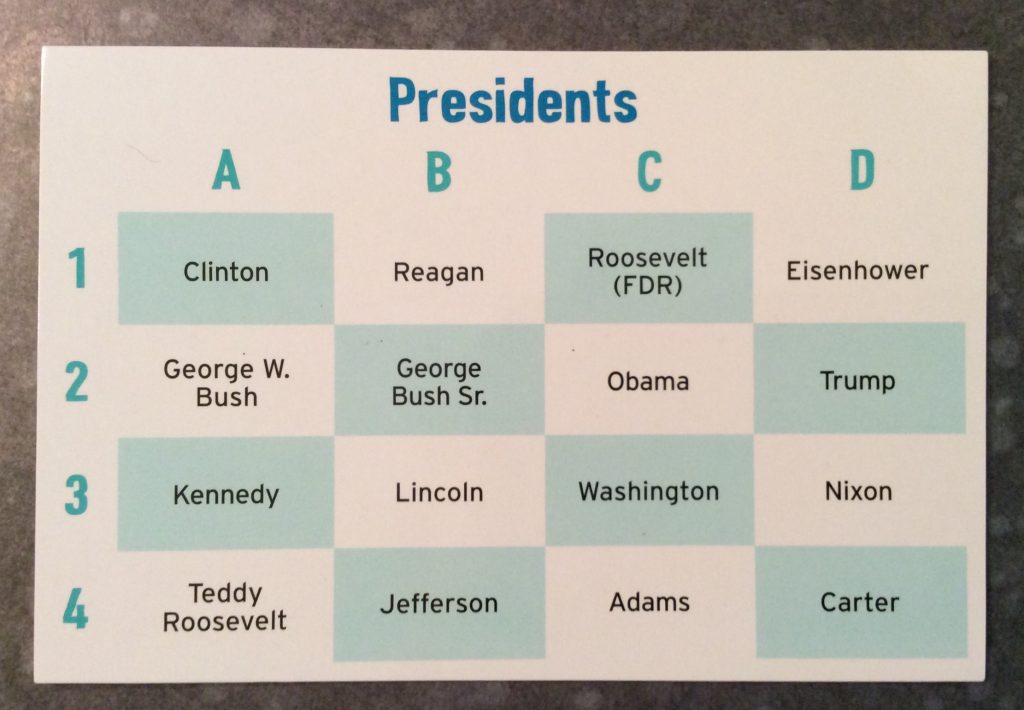 and we roll a Yellow 2 and a Blue 3
and we roll a Yellow 2 and a Blue 3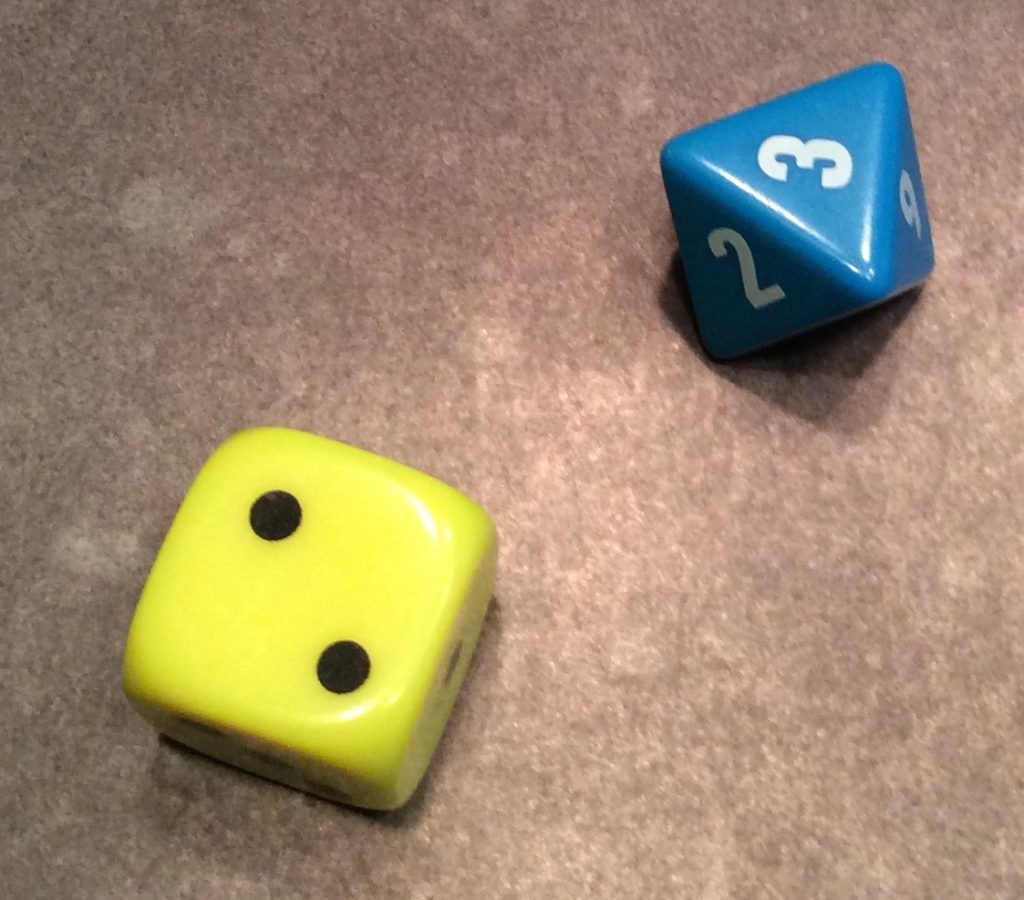 Then everyone except the Chameleon will consult their cards
Then everyone except the Chameleon will consult their cards 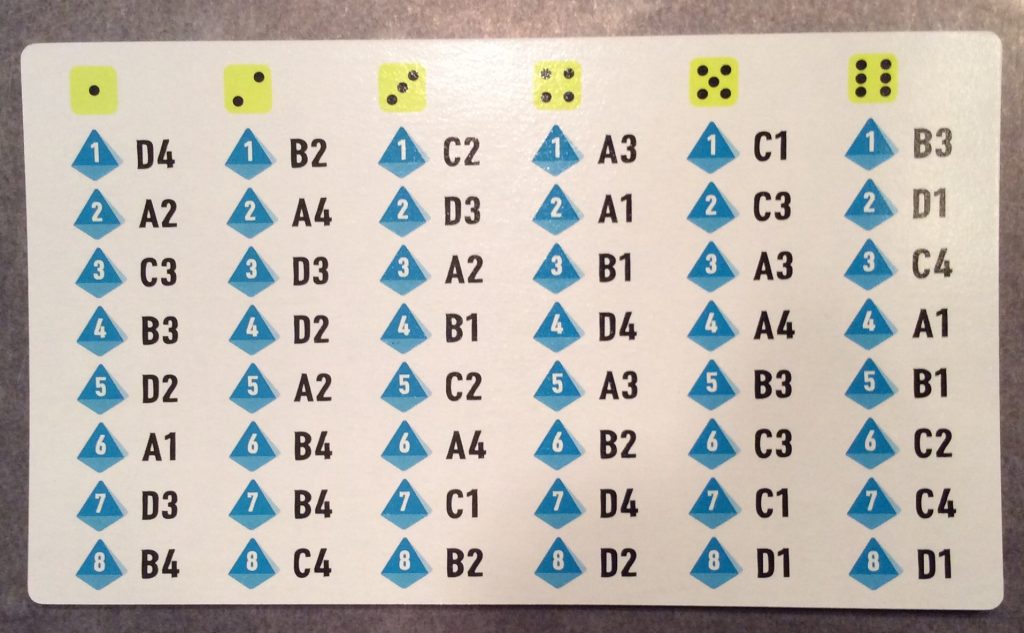 and will know that the Secret word is Nixon.
and will know that the Secret word is Nixon.
Player one says the word “jowls.” Player two says the word “scandal.” Player three is the Chameleon and says “elected,” trying to be vague but on topic. Player four says the word “disgraced.” Everyone debates and then votes, and it is clear that Player 3 is the Chameleon, but Player 3 has been paying attention and guesses that the Secret Word is Nixon, and wins the round.
There are 2 different sets of Code cards in the game, Green and Blue. This allows for you to play for a long time before someone starts to memorize the grid coordinates and resort to cheating as the Chameleon (because, let’s face it, there are those gamers out there). In the example above, we were using the Blue Code cards. If we had been using the Green Code cards,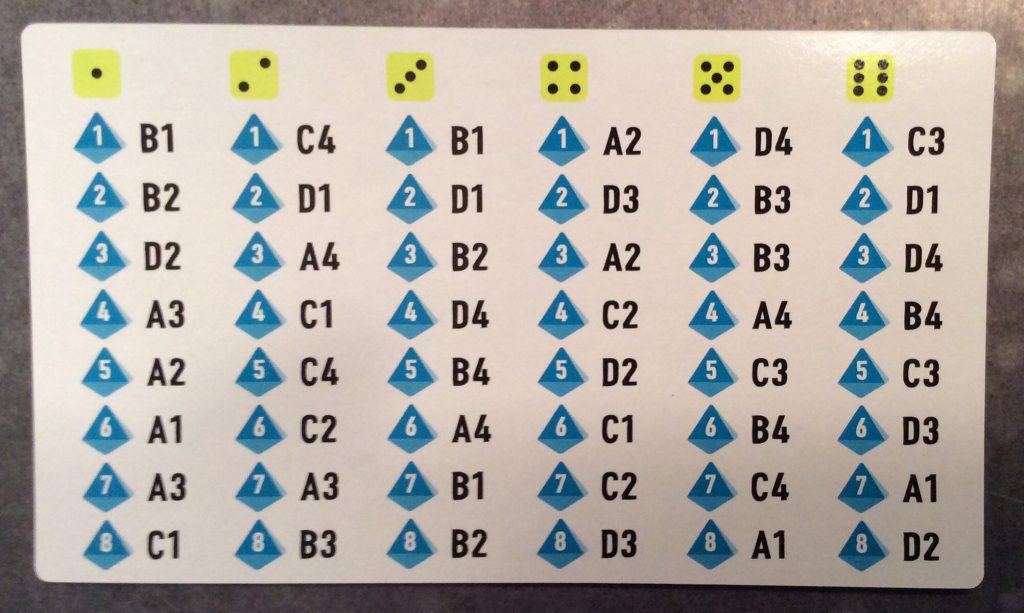 the Secret Word would’ve been Teddy Roosevelt, changing the entire round (although “jowls” might still have been okay).
the Secret Word would’ve been Teddy Roosevelt, changing the entire round (although “jowls” might still have been okay).
So what are our thoughts?
I don’t mind being the traitor, or the Fascist (Secret Hitler) or the Cylon (BSG), it happens a lot, I just usually have more time to think and prepare. One round isn’t a whole lot of time. Of course it also means that you aren’t stuck as the Chameleon for multiple rounds either. Games go really quickly. Most of ours were 5 minutes or less for the 4 player game and about 10-12 minutes for the 8 player game.
Luckily for me, the game is not about winning necessarily. Sure it feels good to win a social deduction game, but the gameplay itself is really where it’s at. I mean, without the tension and intrigue, you lose a lot.
So, where does that leave The Chameleon?
There isn’t really time for the game to sufficiently develop the tension or the intrigue most social deduction games do, so what it has instead is the humor. I mentioned that half the time I couldn’t even remember who had won, and that is because we were too busy laughing and making fun of each other for forgetting the rules or making obvious mistakes to care. The fun is not in the winning or losing but in the ridiculousness of the words we were using to point to the Secret word.
But because of its quickness, the game is much better with more players. Playing with just 4, we immediately knew almost every round who the Chameleon was. Once we played with 8 players, the game became much more enjoyable, especially since the Chameleon was often nearer the last player than the first, giving the Chameleon longer to deduce the Secret Word and blend in.
Another interesting thing about The Chameleon is that in not only scales in number but also in scope and appropriateness. If you have a very knowledgeable group, the clues given are going to be more obscure, more out there. If you have a particularly “adult” group, then you may end up playing Chameleon After Dark (or something like that). There is even a customizable game board included so that you can come up with your own Categories and Words to play with.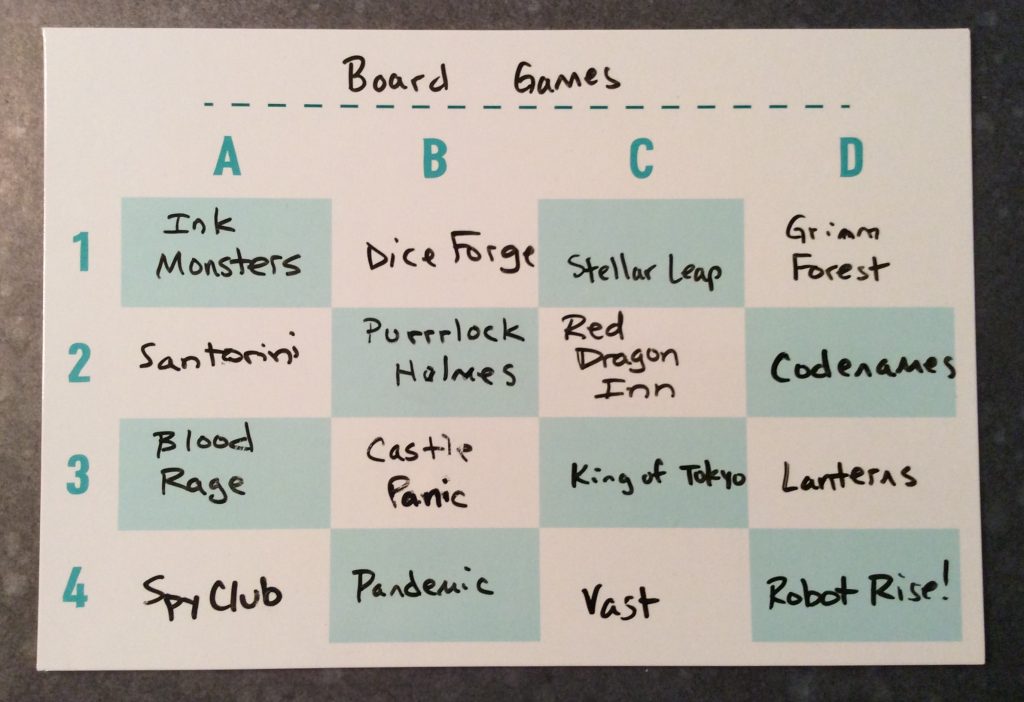
Being the 1st or 2nd player is extremely difficult when you are the Chameleon. In fact, I found it almost impossible to blend in. I’m sure the more you play it, the better you will be at being just vague enough to confuse everyone else. And, even if you are outed as the Chameleon, you have the chance to guess the work and salvage the round. On the flip side, if you play too much, you may start learning the cards too much and know some of the vague terms that will “usually” work, thereby giving you a distinct advantage over newer players.
But, like I said, It’s not about winning and losing. It’s about being ridiculous. For example, the first time I was the Chameleon, I couldn’t even come up with a word. It was the first game we had ever played, and I was the first player, so you can see where I was having trouble. Everyone pretty much knew I was the Chameleon immediately. Then a couple of rounds later, I was the Chameleon again and simply forgot to look at my card after the dice were rolled.
Pro Tip: Look at your card after the dice are rolled.
This was probably the funniest thing that happened during the entire game. You also have to make sure that you don’t go too quickly. You want to take your time to come up with a word that will clue the other players into the fact that you are not the Chameleon. But if you are the Chameleon you can’t take too long or everyone will figure it out.
Pro Tip: Take your time, but not too much time.
This is not the most complicated social deduction game you will ever play. In fact it’s pretty simple, but a game doesn’t have to be complicated to be fun. Just don’t base your judgement of the game on whether you win or lose. Ridiculousness is the key. Say the Category is Presidents. Giving a clue such as “corrupt” could refer to several Presidents on the list. “Elected” might be too vague. “Orange” is going to be too specific.
Pro Tip: “Jowls” apparently refers to Nixon.
Most of the time, it doesn’t matter if you gave away the secret word. Was it funny? Then everyone wins! This is the key. As long as you are having fun, then the game is definitely worth it. If your looking for a fun, fast party game, check this one out.
Party Ninja Approved.
Big Potato Games sent us a copy of Chameleon in exchange for an honest review which is exactly what we provided.
